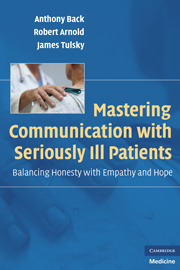Book contents
- Frontmatter
- Contents
- PREFACE
- 1 TAKING YOUR SKILLS TO THE NEXT LEVEL
- 2 GETTING A GOOD START
- 3 TALKING ABOUT SERIOUS NEWS
- 4 DISCUSSING EVIDENCE FOR MAKING TREATMENT DECISIONS
- 5 DISCUSSING PROGNOSIS
- 6 BETWEEN THE BIG EVENTS
- 7 CONDUCTING A FAMILY CONFERENCE
- 8 DEALING WITH CONFLICTS
- 9 TRANSITIONS TO END-OF-LIFE CARE
- 10 TALKING ABOUT DYING
- 11 CULTIVATING YOUR SKILLS
- APPENDIX A THE ROADMAPS IN OUTLINE FORM
- APPENDIX B ACKNOWLEDGMENTS
- INDEX
1 - TAKING YOUR SKILLS TO THE NEXT LEVEL
Published online by Cambridge University Press: 23 November 2009
- Frontmatter
- Contents
- PREFACE
- 1 TAKING YOUR SKILLS TO THE NEXT LEVEL
- 2 GETTING A GOOD START
- 3 TALKING ABOUT SERIOUS NEWS
- 4 DISCUSSING EVIDENCE FOR MAKING TREATMENT DECISIONS
- 5 DISCUSSING PROGNOSIS
- 6 BETWEEN THE BIG EVENTS
- 7 CONDUCTING A FAMILY CONFERENCE
- 8 DEALING WITH CONFLICTS
- 9 TRANSITIONS TO END-OF-LIFE CARE
- 10 TALKING ABOUT DYING
- 11 CULTIVATING YOUR SKILLS
- APPENDIX A THE ROADMAPS IN OUTLINE FORM
- APPENDIX B ACKNOWLEDGMENTS
- INDEX
Summary
The challenge
Telling a mother of two that her colon cancer has returned – and it's incurable. Explaining to a schoolteacher that to continue working, she will need portable oxygen. Giving the news to an accountant with chronic hepatitis that his incidentally discovered hepatocellular cancer is unresectable, so he's off the transplant list. Explaining to a father with refractory congestive heart failure that he needs hospice.
For those of us who care for these patients, these conversations are part of the territory that we learned to navigate mostly by trial and error. Even after years of experience, we still need to take a deep breath before getting started, to prepare for a conversation that will change the life of the person before us.
Patients and their families remember these conversations like they happened yesterday. They can remember what the doctor said, often word for word. They remember whether the doctor rose to the challenge with honesty, kindness, and resourcefulness, or whether the doctor filled an awkward silence with medical jargon. They remember whether they left the visit hopeful or confused.
How clinicians handle these difficult conversations can make or break a therapeutic relationship. We have seen clinicians who take on the challenges and others who sidestep them. Most of those who steer clear of tough encounters have good intentions but don't know how to act on them.
- Type
- Chapter
- Information
- Mastering Communication with Seriously Ill PatientsBalancing Honesty with Empathy and Hope, pp. 1 - 10Publisher: Cambridge University PressPrint publication year: 2009



